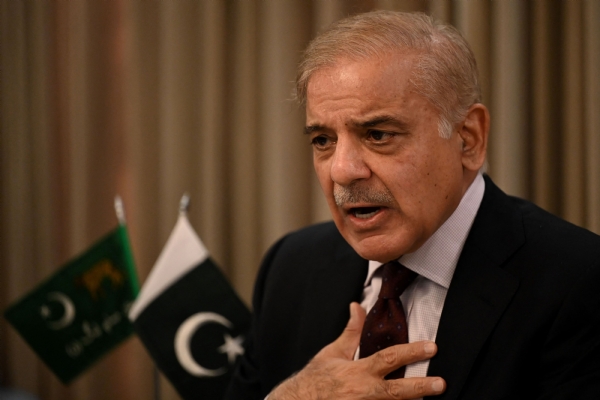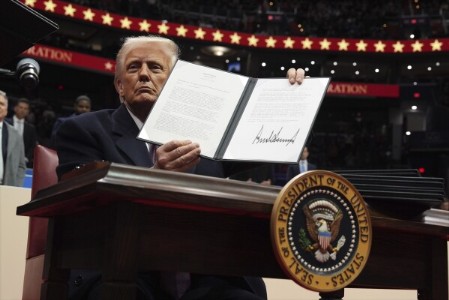Pakistani leadership: Flogging a dead horse
Total Views | 123
As the world stands poised to witness the culmination of the holy month of Ramzan and the celebration of Eid-ul-Fitr on 20-22 April, the people of Pakistan, a country that was carved out on religious grounds, stand desolate and insecure as they grapple with a deep political and economic crisis. The situation has been steadily deteriorating over the past many years, now it has reached a level of being an existential crisis.

The social media is replete with visuals of riot-like situations across the country for procurement of basic food items like wheat and cereals. In certain instances even the prime minister of the country, Shahbaz Sharif, is seen personally distributing wheat to the people.
It is notable that Shahbaz Sharif engineered the ouster of his predecessor, Imran Khan, through a no-confidence motion in the parliament based on accusations of gross economic mismanagement. The situation has only worsened in the past one year since the PML-N and PPP coalition has taken over the reins of the country. The derivative is that no political entity in Pakistan has exhibited the vision or the will to turn around the unbearable situation.
Imran Khan is now baying for the blood of his political opponents. The government has attempted to browbeat him with registration of a slew of cases against him. As many as 80 cases have been registered in Punjab alone and a serious attempt has been made to arrest him. He has been granted bail by the Islamabad High Court till May 3.
Khan continues to make allegations of harassment against the government and has delivered some powerful addresses to the people. There is a huge sympathy wave for him which is causing ripples of concern within the government and the all powerful Pakistan army. A desperate attempt is being made to delay the elections, in which Khan seems to have a better chance of emerging a victor.
The unfortunate part is that while the feudal lords of Pakistan and the senior leadership of the Pakistan army continue playing their power games, the people have reached a stage where they are feeling forsaken and let down even as many are dying of hunger.
Even if Imran comes back into power, the crisis in the country is likely to continue since the malaise runs much deeper than the food crisis. Industries have either shed their manpower to cut losses or closed down altogether leading to rampant unemployment. As a result, inflation is spiralling to an extent where the Pakistani rupee is losing credibility in its own country.
The International Monetary Fund (IMF), Pakistan's second biggest saviour after China, also seems to be losing faith in the country. It is dilly-dallying on the release of a mere $3 Billion that the country needs urgently. The reason being given is the failure of the country in providing necessary "financing assurances” for the successful conclusion of the talks. This may well be the last nail in Pakistan's financial coffin; it can lead to the closure of even government supported banks of the country.
The IMF, of course, cannot be blamed for taking a hard-line. Successive governments in Pakistan have reneged on their promises of exercising austerity in expenditure; increasing the tax base; controlling inflation, stabilising foreign exchange reserves and reducing dependence on imports of luxury items. At best, half hearted attempts have been made in this direction, which have not given the desired result of ushering financial reforms.
The Pakistan army has remained least concerned about the financial situation and has insisted upon increasing its budget to meet the "threat that India poses to the security of the country." The fact that, ever since independence and partition of the sub-continent, India has never exhibited any expansionist design towards Pakistan is summarily brushed under the carpet. The bogey of Kashmir and India's perceived belligerence continues to be played out to create a "security imperative" and insist on unaffordable military preparedness.
What the military is not ready to accept is that the actual threat to Pakistan is emanating internally through the Tehreek-e-Taliban Pakistan (TPP). In recent days the TTP has, most disdainfully, broken its peace accord with the government. Clearly, the TPP has used the ceasefire to recuperate and is now getting ready to seize power as has been its intent all along. In recent times, it has resumed its violent activities with renewed strength, leading to a spate of terror attacks across the country and resulting in the death of scores of innocent civilians.
It has to be reiterated here that the warlords and the terrorists of TPP are the product of the self destructive policy of the Pakistan army, whereby, it used Pakistani soil to create a militant pool for use against India (Kashmir) and Afghanistan. No country in the world could have cut its feet in a more devastating manner than this.
The tragedy of Pakistan is compounded by the fact that, even when the country is under such debilitating circumstances, the notorious Inter Services Intelligence (ISI) has not desisted from its grand plan to create disruption and divisiveness in the border areas of its neighbouring countries, especially India. While the attempt to keep the pot boiling in Kashmir continues, the "Khalistan" card has been activated towards Indian Punjab.
Experts are of the opinion that Amritpal Singh, who attempted to generate a wave of separatism in Punjab and went down with whimper when accosted by the might of the Indian/Punjab law and order machinery, was an implant of the ISI. He was nurtured in Dubai with a specific agenda and inducted into Punjab after due training, indoctrination and assurance of financial support.
The operation was extended to other countries by activation of the fringe population of Sikh radicals in support of the Khalistan cause with shrill propagandist rhetoric. The game plan is to create a rift between the Hindu and the Sikh communities in foreign shores and in Punjab and then engineer a spill over to the rest of the country. This diabolic plan is still operational though severely weakened due to the bursting of the Amritpal bubble and pressure on radical forces operating in foreign countries.
Pakistan has, since its existence, been garnering financial support from foreign powers by creating disturbance in South Asia. The leadership of the country would be well advised to cease its attempts to create such disturbances since the major powers have shifted strategic focus to Europe and other regions and it is no longer relevant to their strategic thought process. The leaders are simply flogging a dead horse; no positive outcome can be expected from their shenanigans.
To get out of the it's self-created mess, the Pakistani leadership including the all powerful army should look at deep and honest people centric reforms. Even a minor success in this direction would open the possibilities of foreign assistance since nobody is in favour of the region disintegrating into small segments that will become even more vulnerable to undesirable influences.
Bharati Web







